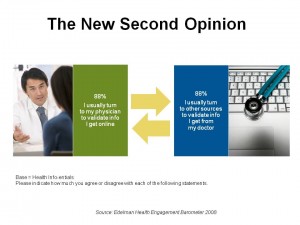 At least one-half of U.S. patients do not believe they have the information they need to manage their conditions once they leave the doctor’s office. Furthermore, most people feel their physicians don’t communicate with them enough about specific kinds of information, including online resources, information about prescription drugs and side effects, and diet. These insights come out of a survey conducted by MedTera, a patient education and marketing firm that serves the life sciences and health care industry.
At least one-half of U.S. patients do not believe they have the information they need to manage their conditions once they leave the doctor’s office. Furthermore, most people feel their physicians don’t communicate with them enough about specific kinds of information, including online resources, information about prescription drugs and side effects, and diet. These insights come out of a survey conducted by MedTera, a patient education and marketing firm that serves the life sciences and health care industry.
Key findings from the study illustrate the chasm between patients and their doctors when it comes to people feeling equipped to manage disease in their daily lives. Specifically:
- 77% of people said they received no written information on their illness and/or meds directly from their physician during their last visit
- 84% of people would find online resources to help manage conditions valuable
- 78% of people would find information on medications and side effects valuable
- 86% would find dietary recommendations based on their condition valuable
- 82% of people would value information on changes in their lifestyle that could help their condition
- 94% of people would find details on the importance of follow-ups and tests valuable.
MedTera surveyed 7,028 patients online in September 2010 to assess their need for disease management education.
Health Populi’s Hot Points: This blog believes in the much-quoted adage of Kaiser Permanente’s Chief Medical Information Officer Dr. John Mattison that patients are the most under-utilized resource in the U.S. health system. MedTera’s patient poll looks under that hood to find an engine without gas: most patients may be willing to engage in health through information, but they’re not getting that information support from their most trusted cog in the health wheel: their physician.
The Edelman Trust Barometer survey conducted in 2008 coined a new term based on a phenomenon found in their consumer poll – “the new second opinion,” highlighted in the chart. Edelman found that 9 in 10 health-engaged people turn to their doctor to verify what they learn online; and, 9 in 10 health-engaged people turn to other sources to validate what they hear from the doctor. However, among all information sources, the doctor and other health experts are seen as most credible.
Thus, while the patient is an under-utilized player in the U.S. health system, it is also true that physicians are under-utilized in their role as credible information purveyor for patients who want to engage more in their health. It is easy to see this is an opportunity — the promise of that opportunity won’t be realized until physicians can justify becoming an information conduit through reimbursement and practice organization (e.g., patient-centered medical home, accountable care organization, capitation, and other models). Electronic health records may also provide a platform for channeling personalized health content to patients in a more efficient workflow.




 I'm in amazing company here with other #digitalhealth innovators, thinkers and doers. Thank you to Cristian Cortez Fernandez and Zallud for this recognition; I'm grateful.
I'm in amazing company here with other #digitalhealth innovators, thinkers and doers. Thank you to Cristian Cortez Fernandez and Zallud for this recognition; I'm grateful. Jane was named as a member of the AHIP 2024 Advisory Board, joining some valued colleagues to prepare for the challenges and opportunities facing health plans, systems, and other industry stakeholders.
Jane was named as a member of the AHIP 2024 Advisory Board, joining some valued colleagues to prepare for the challenges and opportunities facing health plans, systems, and other industry stakeholders.  Join Jane at AHIP's annual meeting in Las Vegas: I'll be speaking, moderating a panel, and providing thought leadership on health consumers and bolstering equity, empowerment, and self-care.
Join Jane at AHIP's annual meeting in Las Vegas: I'll be speaking, moderating a panel, and providing thought leadership on health consumers and bolstering equity, empowerment, and self-care.